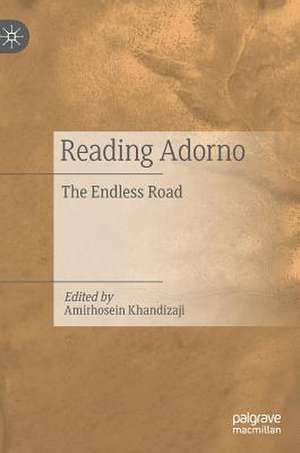Reading Adorno: The Endless Road
Editat de Amirhosein Khandizajien Limba Engleză Hardback – 10 iul 2019
| Toate formatele și edițiile | Preț | Express |
|---|---|---|
| Paperback (1) | 525.20 lei 43-57 zile | |
| Springer International Publishing – 14 aug 2020 | 525.20 lei 43-57 zile | |
| Hardback (1) | 698.80 lei 43-57 zile | |
| Springer International Publishing – 10 iul 2019 | 698.80 lei 43-57 zile |
Preț: 698.80 lei
Preț vechi: 822.12 lei
-15% Nou
Puncte Express: 1048
Preț estimativ în valută:
133.72€ • 139.96$ • 111.29£
133.72€ • 139.96$ • 111.29£
Carte tipărită la comandă
Livrare economică 31 martie-14 aprilie
Preluare comenzi: 021 569.72.76
Specificații
ISBN-13: 9783030190477
ISBN-10: 3030190471
Pagini: 262
Ilustrații: XII, 253 p. 1 illus.
Dimensiuni: 148 x 210 mm
Greutate: 0.47 kg
Ediția:1st ed. 2019
Editura: Springer International Publishing
Colecția Palgrave Macmillan
Locul publicării:Cham, Switzerland
ISBN-10: 3030190471
Pagini: 262
Ilustrații: XII, 253 p. 1 illus.
Dimensiuni: 148 x 210 mm
Greutate: 0.47 kg
Ediția:1st ed. 2019
Editura: Springer International Publishing
Colecția Palgrave Macmillan
Locul publicării:Cham, Switzerland
Cuprins
Part 1. Diagnosis.- 1. Two Critiques of Identity: Adorno and Castoriadis on the Capitalist Imaginary; Craig Browne.- 2. Adorno, De Martino and the Adventures of the Self; Stefano Petrucciani.- 3. The Truth-Potential (Wahrheitsgehalt) of the Culture Industry: On the Actuality of Horkheimer and Adorno’s diagnosis; Hauke Brunkhorst.- 4. Laughing at the Other: Toward an Understanding of the Alt-Right with Adorno; Claudia Leeb.- 5. Bella Swan and Katniss Everdeen: The Expectation of Motherhood in the Culture Industry; Laci Hubbard-Mattix.- Part 2. Remedy.- 6. The Sensible and the Intelligible: Artistic Form and Testimony in Adorno’s Reflections; Giuseppe Di Giacomo.- 7. Adorno and the Subversive Potential of Popular Music; Hans-Herbert Kögler.- 8. Adorno and the Magic Square: Schönberg and Stravinsky in Mann’s Doctor Faustus; Geoff Boucher.- 9. 'Idiot with a Spoon’: Adorno, Petrini, and the Oppositional Politics of Slow Food; Mary Caputi.- 10. Functionalism Yesterday, Functionalism Tomorrow: Thoughts Inspired by Adorno’s Address to the Deutscher Werkbund, “Funktionalismus Heute,” Delivered in Berlin on October 3, 1965; Barry M. Katz.
Notă biografică
Amirhosein Khandizaji holds a PhD in Sociology, Free University of Berlin, Germany, and is the Founding Editor of the Berlin Journal of Critical Theory.
Textul de pe ultima copertă
“Khandizaji has put together a fine volume of essays on the legacy of Theodor W. Adorno. Including some of the best known students of his work, this anthology is provocative, unorthodox, and generates reflection about one of the great figures in the history of philosophy.”— Stephen Eric Bronner, Board of Governors Professor of Political Science, Rutgers University, USA
“This collection reveals the depth and potentialities of Adorno’s critical theory in understanding our present. The contrbutions examine the resources of Adorno’s culture industry theory, his accounts of popular and classical music, and how his theory helps us understand the emergence of the alt-right: a valuable addition to Adorno studies.” —J. M. Bernstein, Distinguished Professor of Philosophy, New School for Social Research, USA
“This scintillating collection brings together seasoned and emerging contributors to the international discussion of Adorno’s legacy to demonstrate how muchit has to teach us in our struggle to confront contemporary challenges.”—Martin Jay, Sidney Hellman Ehrman Professor Emeritus, University of California, Berkeley, USA
This book draws on core concepts coined by Adorno, such as identity thinking, the culture industry, and his critique of the autonomous and rational subject, to address the ills that plague neoliberal capitalist societies today. These ills range from the risk of a return to totalitarian tendencies, to the global rise of the far-right, and anti-feminist conceptions of motherhood. Subsequent chapters outline the ways in which Adorno's thought can also be seen to redress the challenges of modern societies, such as the critical function of artworks, and the subversive potential of slow-food and popular music. The important underlying concern of the book is to highlight the continuing relevance of Adorno, both in dealing with the failures of neo-liberal capitalist societies, and in his applicability to a wide range of disciplines.
“This collection reveals the depth and potentialities of Adorno’s critical theory in understanding our present. The contrbutions examine the resources of Adorno’s culture industry theory, his accounts of popular and classical music, and how his theory helps us understand the emergence of the alt-right: a valuable addition to Adorno studies.” —J. M. Bernstein, Distinguished Professor of Philosophy, New School for Social Research, USA
“This scintillating collection brings together seasoned and emerging contributors to the international discussion of Adorno’s legacy to demonstrate how muchit has to teach us in our struggle to confront contemporary challenges.”—Martin Jay, Sidney Hellman Ehrman Professor Emeritus, University of California, Berkeley, USA
This book draws on core concepts coined by Adorno, such as identity thinking, the culture industry, and his critique of the autonomous and rational subject, to address the ills that plague neoliberal capitalist societies today. These ills range from the risk of a return to totalitarian tendencies, to the global rise of the far-right, and anti-feminist conceptions of motherhood. Subsequent chapters outline the ways in which Adorno's thought can also be seen to redress the challenges of modern societies, such as the critical function of artworks, and the subversive potential of slow-food and popular music. The important underlying concern of the book is to highlight the continuing relevance of Adorno, both in dealing with the failures of neo-liberal capitalist societies, and in his applicability to a wide range of disciplines.
Caracteristici
Marks the 50th anniversary of Adorno's death Provides a series of readings of some of Adorno’s key themes and concepts in essays written by contemporary commentators Outlines the ways in which Ardorno's work chimes with contemporary social issues such as neoliberalism, resurgent right-wing populism, selfie and celebrity ‘culture’, and environmental catastrophe
